You probably know that following a healthy diet can help prevent heart disease, prevent certain types of cancer, and support a healthy weight, but did you know that certain foods may also help protect your brain?
As someone with a family history of dementia, I feel empowered knowing that my eating habits can lower my risk of dementia. I want you to have all of the tools in your toolbox so that you, too, can protect your brain.
Hi, I’m Laura – a registered dietitian, culinary nutritionist, and a huge proponent of the MIND Diet, an eating plan that has been shown to help protect our brain health!
In this blog post, I’ll go through what the MIND Diet is and a little about the research behind it, which will make it super clear why I highly recommend it! This blog will explain what foods to include, how often, and what foods to limit.
You’ll finish this post with some doable and delicious ways to incorporate the MIND diet principles into your on-the-go lifestyle.
Note: This post contains affiliate links. As an Amazon Associate, I earn from qualifying purchases.
Table of Contents
What is the MIND Diet?
The MIND Diet stands for Mediterranean-DASH Intervention for Neurodegenerative Delay Diet – a mouthful, right? It’s basically a combination of Mediterranean and DASH diets but focuses on the foods that are particularly important for brain health.
Why these two diets? Researchers found that while both the Mediterranean and DASH Diets were important diets for reducing the risk of heart disease, there were some benefits for brain health as well.
This led to a question – are certain components of each of these diets extra important for our brains? Will eating more of those particular foods positively impact brain health and further reduce the risk of or delay the development of dementia?
Researchers at RUSH University in Chicago developed this hybrid diet that focuses on foods that are particularly important in brain health. They followed over 900 older adults living independently for 4 ½ years. The study participants’ diets were evaluated to determine how closely they followed the MIND diet, Mediterranean Diet, and DASH Diet.
What they found was, at least to me, astonishing! Those who followed the MIND Diet closely had a 53% reduced risk of developing Alzheimer’s Disease. What was even more interesting was that people who only partially followed the MIND diet – meaning they incorporated some of the principles but didn’t follow them strictly –still had a 35% reduced risk of developing Alzheimer’s disease.
Such a relief to know that we don’t have to follow these dietary guidelines to the letter 100% of the time to reap the benefits
What Foods to Eat on the MIND Diet?
Nine food groups are strongly encouraged to be included regularly as part of the MIND diet. Each of these has been shown to help support brain health and reduce cognitive decline. Some foods you should eat every day and others a few times a week.
Many of the foods that are included in the MIND diet are found in many different eating styles and cultures. This makes it an easy diet for most everyone to follow.
Here’s a chart of the foods to include and how often you should eat them.
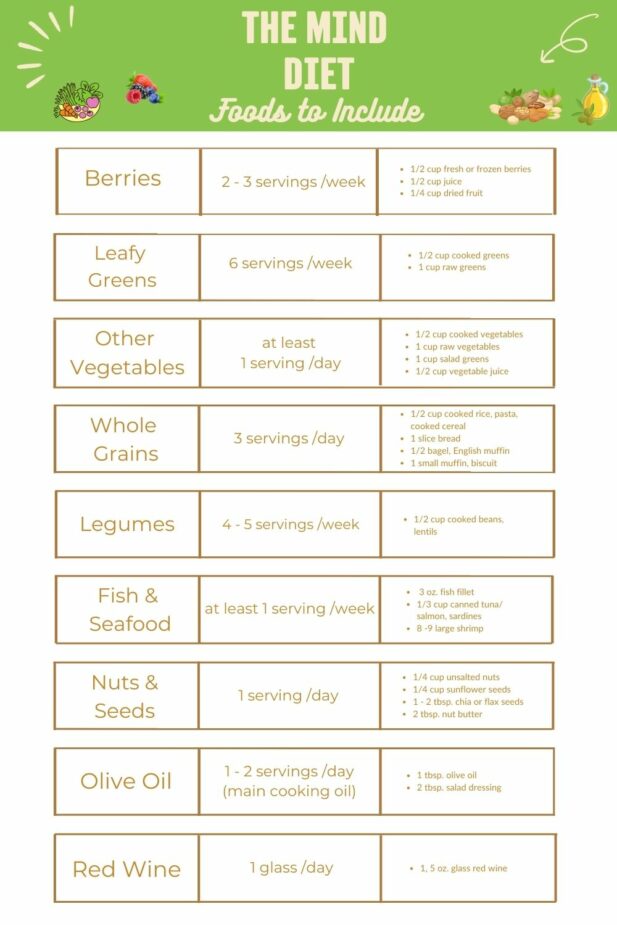
Other foods that aren’t specifically included in the official MIND diet are also important to eat regularly. Eggs, dairy products, soy foods, and other fruits, and potatoes may not be called out specifically as a part of the MIND diet, but they each contain nutrients that are important for brain health.
Eggs: Eggs contain a nutrient called choline. This is a “B-like” vitamin that is essential for brain development in children. It also appears to have a role in brain health as we age. Some observational studies have shown people with higher levels of choline performed better on memory and learning tests.
Dairy Products: Milk and yogurt have nutrients that increase the amount of an antioxidant found in the brain called glutathione. This antioxidant helps protect our brain from some of the damage that occurs with normal aging. Fermented dairy products, like yogurt and kefir, have higher levels of antioxidants than regular milk.
Soy Foods: Soy is part of the bean and legume group, but I think it is worth singling out here. Foods like tofu, tempeh, miso, and soy milk are rich in isoflavones. These are plant compounds that resemble estrogen and have been shown to reduce cholesterol levels and protect against certain types of cancer.
In the brain, these isoflavones appear to help improve memory and brain health. Some research has shown that people who eat more soy foods have a lower incidence of dementia.
Other Fruits: While berries are specifically called out in the MIND diet because of their positive impact on brain health, other fruits are also an important part of a brain-healthy diet. So don’t skimp on fruits like bananas, mangos, apples, or citrus fruits. They contain antioxidants, vitamins, and minerals that are essential for brain health too.
What Foods Should be Limited on the MIND diet?
Rather than a strict “avoid,” the MIND diet encourages limiting the following foods to just occasionally.
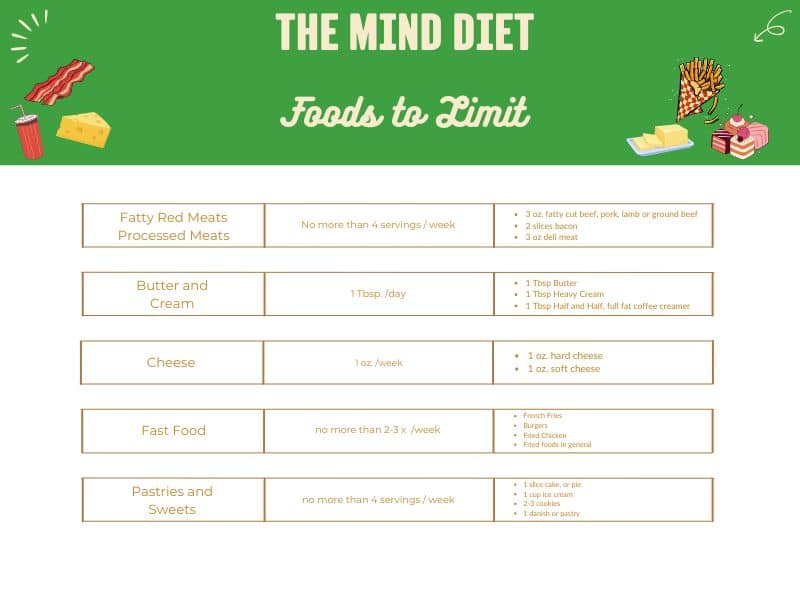
How Does the MIND Diet Help Brain Health?
The MIND Diet has immense power to support our brain health.
The foods included in the diet have been shown to positively affect our memory, learning, coordination, and mood. The various foods that are included are nutritional powerhouses that play a particular role in brain health.
For instance, leafy greens, including spinach, kale, Brussels sprouts, and even romaine lettuce, contain several nutrients, including antioxidants and vitamins that help protect our brain function.
Eating just one serving of leafy greens – any leafy greens – a day can slow the decline in our brain function.
Seafood is another example of a brain-healthy food. Seafood that is high in omega-3 fatty acids, like salmon, tuna, and sardines, is especially helpful. These healthy fats are known to protect against heart disease, but they help prevent the formation of amyloid protein clusters in our brains.
What are amyloid protein clusters? They are a group of natural proteins that clump together and form clusters in the brain. Those clusters block the brain’s communication network, which makes it harder for us to learn and retain information. These clusters also can negatively impact our coordination.
Is the MIND Diet Helpful for Overall Health? Yes!
Like the Mediterranean and DASH Diets, the MIND diet is also helpful for maintaining our overall health. U.S. News and World Report Best Diets of 2024 ranked the MIND Diet #3 for overall health. It came in just behind the Mediterranean and DASH diets.
What do they love about it? Many of the same things that I love – it is easy to follow, adaptable, and very flexible. It’s an eating plan that anyone can follow. Yes, even if you are gluten-free, are pregnant, have young children in the house, or are empty nesters.
Beyond supporting brain health and reducing the risk of dementia, the other reason the reviewers love this diet is that it can help lower the risk of other health issues that are more frequent as we age.
- Heart health – Lowered total and LDL cholesterol and up to 42% reduction in triglycerides have been reported in people following the MIND diet. One study also found at least a 16% reduced risk of cardiovascular disease when following the MIND diet. Interestingly, each increase of whole grains reduced the risk of cardiovascular disease( CVD) by 60%, leafy greens by 45%, and beans by 65%.
- Diabetes – There is limited research on the benefits of following the MIND Diet and a reduced rate of type 2 diabetes. Additionally, some limited research has found that people who have type 2 diabetes and follow the MIND Diet, also have lower rates of heart disease.
- Weight loss – This healthy eating plan also seems to help with weight reduction and other measurements of weight loss. Some people who follow the MIND diet have experienced reduced weight, reduced waist circumference, and lowered body fat.
- Stress relief – Many of the same foods that are included in the MIND diet are also known to help reduce stress. Seafood, nuts, seeds, whole grains, beans, and leafy greens contain nutrients that help manage the hormones that keep us calm and collected.
So yes, the MIND Diet is great for our overall health, especially as we age.
Who is the MIND Diet For?
Anyone can follow the MIND diet! However it is designed for people who want to improve their brain health and try to reduce the risk of Alzheimer’s disease and dementia.
For my husband and myself, we both have a family history of dementia. So being strategic to optimize our diets to reduce our risk is vitally important. This is why I wrote my book – MIND Diet for Two. It is also why so many of my recipes on this site are MIND Diet-friendly.
However, even if you don’t have a history of dementia in your family, this eating plan is still a great option because of the nutrient-dense foods that are key players in this plan.
Many of the recipes you’ll find here, in my cookbook and other MIND Diet cookbooks are recipes everyone will love! They are made with familiar foods and full of flavorful ingredients. You can eat pasta, seafood, chicken, salads, sandwiches and of course lots of fruits and vegetables as well as sweet treats!
Your Guide to Implementing the MIND Diet
The MIND diet isn’t intended to be a strict diet by any means. It’s not an all-or-nothing approach, you can still include your favorite foods some of the time.
This approach to nourishing your brain is about incorporating more nutrient-dense foods into your meals that are beneficial for your brain. Then also limiting foods that are high in saturated fat, trans fats, and sugar.
Remember, we eat for pleasure too! We can – and should – enjoy what we eat while supporting our health too.
So what is the best way to start following the MIND diet?
For anyone trying to start following a new eating plan, I always suggest taking it a step at a time. Start with one or two things you can easily add to your meals and get used to those. Then start adding more things in. Here are a few ideas to get you started:
- Add a handful of berries to your morning cereal or yogurt.
- Nibble on some nuts with dried fruit for a snack in the afternoon.
- Smoothies are a great way to add berries, leafy greens, nuts, and seeds to your breakfast or as a snack.
- Choose whole-grain bread instead of white bread for your lunchtime sandwich.
- Use olive oil instead of other oils or butter when you are cooking.
- Add a side salad to your dinner and top it with a tablespoon of nuts.
- Order seafood when you go out to lunch or dinner. This is especially helpful if you aren’t comfortable cooking seafood at home. If you want to cook more seafood at home, check out my article on the 5 Healthy Ways to Cook Seafood at Home for some simple ideas.
- Add an extra serving of vegetables to your dinner or lunch.
- Add chopped spinach or kale to scrambled eggs.
- Add beans to a salad, like my Italian Bean Salad. They are also delicious in soup like my Lemon Chicken and White Bean Soup. Or make a quick hummus – you’ll love my Spinach and Artichoke Hummus!
- For some extra leafy greens add romaine lettuce, arugula, or spinach to your sandwich.
There are many ways to add one of two foods included in the MIND diet to your meals. Check out all of my MIND Diet Recipes for ideas.
Pros and Cons of the MIND Diet
There are many pros to following the MIND Diet, including
- It is flexible. It is more of a healthy eating plan than a strict diet.
- A wide variety of foods can be included and no foods are eliminated.
- It is budget-friendly.
- It is easy to make meals for families or just one or two people.
- You can easily eat in restaurants when following this diet.
While there are many good things about following the MIND diet, there are a few things to consider.
- It is very plant-forward, meaning it incorporates a lot of fruits and vegetables. While canned and frozen fruits and vegetables work on this diet, some may find it to be a little more expensive to follow.
- This diet is high in vitamin K so people taking a blood thinner should not suddenly start this diet. If you are taking a blood thinner, talk with your Registered Dietitian to see how to modify or adjust this eating plan. To find a Registered Dietitian in your area, look at The Academy of Nutrition and Dietetics, Find a Nutrition Expert.
- It may take more time to plan meals until you get used to it. Start slowly by trying one or two new things at a time. Before you know it you’ll add many of these foods without a second thought!
Keep reading
For more information about the MIND diet, I suggest:
- The Official MIND Diet Book – By Dr. Martha Clare Morris – the creator of the MIND Diet
- MIND Diet for Two Cookbook – This is my book with recipes designed for 2 people
- U.S. News and World Reports – Best Diets Overview of the MIND Diet
Bottomline
Following this brain-healthy diet is one really important thing you can do to boost your brain health. Start by incorporating just one or two of the foods into your meals regularly. Then focus on cutting back on one two of the foods “to limit.”
If you want to learn more about the MIND diet? Join my community and I’ll send you a FREE 7-day MIND Diet meal plan with recipes and a shopping list. Grab your copy today to jump-start your road to better brain health!

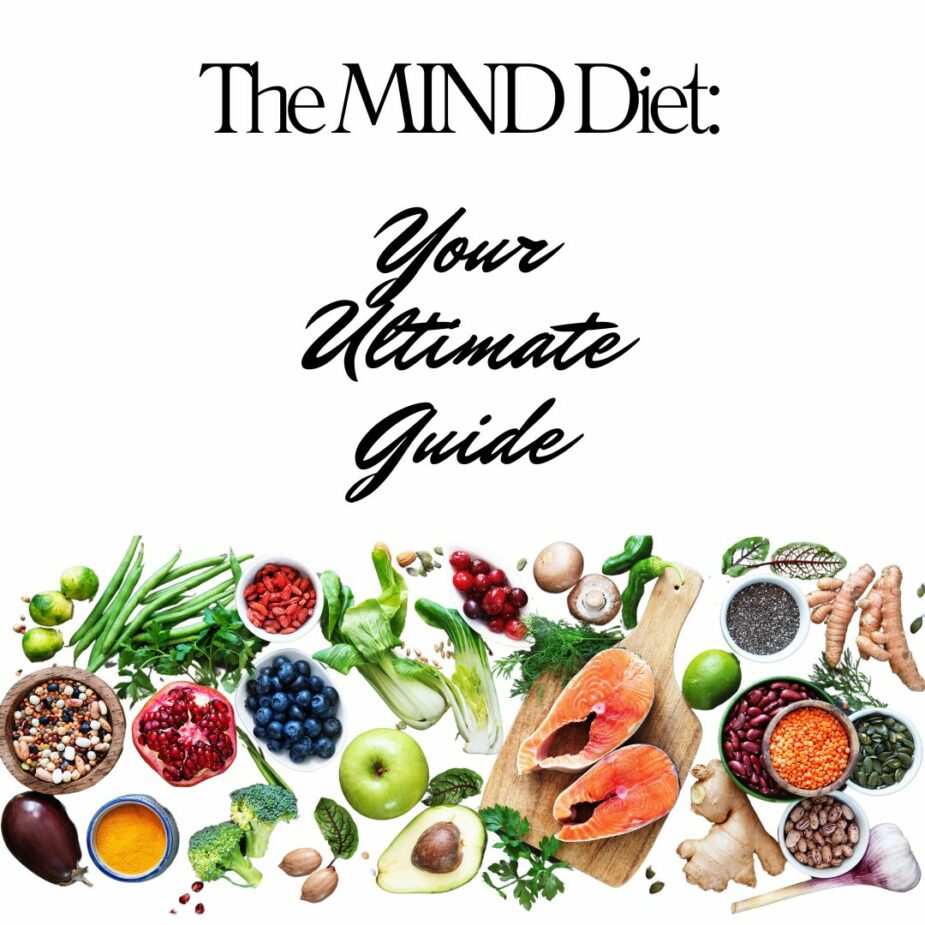

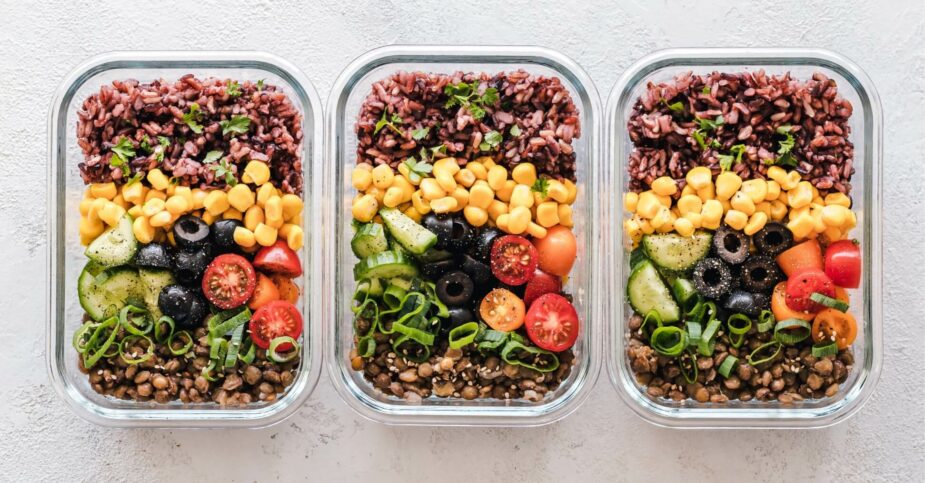

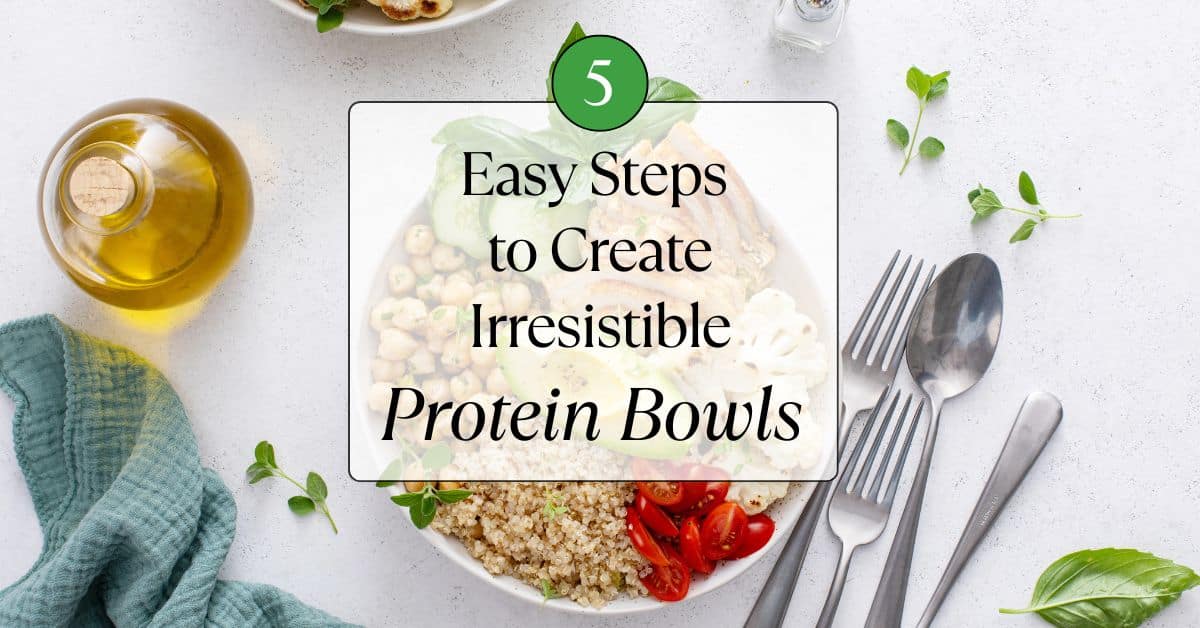


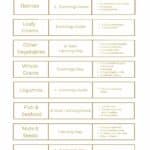

2 thoughts on “Discover the Benefits of the MIND Diet: Your Ultimate Guide”
Another list calls for 3 oz poultry “at least 2 /week”. You don’t have it on your list at all, but do mention it in discussion. Your Lemon Chicken & White Bean Soup calls for meat from a rotisserie or own-roasted chicken.
So, is it best to limit to chicken breast, or are thighs and drumsticks ok? Do your sources agree with the 3 oz quantity 2 or more times/week?
Hi Tegan, You are right – yes, poultry (3 oz portions at least 2 x a week) is included and I will add that to my list. Both chicken breasts and dark meat like thighs are a good source of protein and B vitamins and some minerals. Thighs do have a bit more fat and saturated fat which is why most people tell you to eat the white meat most often. However, dark meat is higher in some vitamins and minerals. So both are fine – always boneless and skinless to reduce the fat as much as possible. And yes, sometimes a rotisserie chicken is okay, especially when you need a quick and healthy meal. Thanks for reading and I’ll fix that list to add poultry. Best, Laura